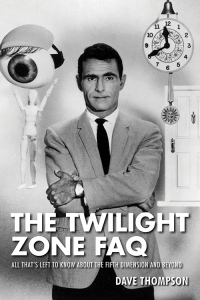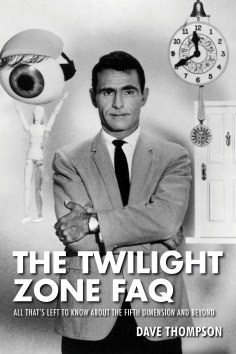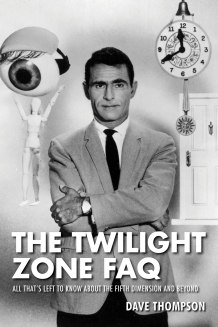Blog Archives
The Twilight Zone FAQ Excerpt
With the New Year a couple days away, Syfy will be airing a Twilight Zone marathon on New Year’s Day. Enjoy an excerpt below from Dave Thompson’s, The Twilight Zone FAQ. The Twilight Zone FAQ takes the reader back to that halcyon era, looking back on the show and its impact as a force for societal change, via reflections on the manifold topics and controversies that the show took on – from the space race to the Red Menace, from paranoia to madness and beyond.
“Where Is Everybody?” (First broadcast: October 2, 1959)
The Twilight Zone’s much-anticipated pilot episode was the tale of a man who found himself alone on a road, walking into a strange town, and discovering that he was the only person there. Every place he visited, from a diner on the outskirts, to the police station, a movie theater and a drugstore, was deserted, and while he continually saw signs of recent activity . . . a boiling coffeepot, a still-lit cigar, a ringing telephone and so on . . . life itself was altogether absent. His sole companions, it appeared, were a dressmaker’s mannequin seated in a car and his own reflection in a mirror.
It is a fascinating study of isolation and loneliness, edging into paranoia and terror. Throughout what quickly turns from a perplexing mystery to a screaming terror, the man cannot help but feel he is under constant observation, and when he finally cracks, that was the horror that he verbalizes. Stop watching me!
 Only in the last minutes of the story do we understand who the man is and why he is in this predicament—an astronaut undergoing isolation training, in the days when the space race was still in its infancy and science had barely succeeded even in launching satellites into space, let alone a manned craft. Some liberties were taken, of course. The dimensions of the Mercury spacecraft, after all, were tiny—so much so that no candidate over five-foot-eleven and 180 pounds could even be considered.
Only in the last minutes of the story do we understand who the man is and why he is in this predicament—an astronaut undergoing isolation training, in the days when the space race was still in its infancy and science had barely succeeded even in launching satellites into space, let alone a manned craft. Some liberties were taken, of course. The dimensions of the Mercury spacecraft, after all, were tiny—so much so that no candidate over five-foot-eleven and 180 pounds could even be considered.
Ferris appears much larger than this (although it is difficult to judge, with all but a few moments of his entire time on-screen being spent alone). But nobody watching the episode would doubt that he readily filled another of the requirements—he was a “superb physical specimen . . . [a] mature, middle-class American, average in . . . and visage, [a] family man.”
But he is also a family man who is left shattered by the sheer desperate loneliness of the mission he is about to undertake. For, staring up at the sky, to the stars and moon, even the most hardened viewer cannot but suppress a shiver as Serling reveals what awaited Ferris, and all who would follow in his footsteps.
“Up there . . . up there in the vastness of space, in the void that is sky . . . up there is an enemy known as isolation. It sits there in the stars waiting . . . waiting with the patience of eons . . . forever waiting . . . in the Twilight Zone.” “Where Is Everybody?” was filmed on the same Universal-International lot that had hitherto featured in such movies as It Came from Outer Space (1953) and Tarantula (1955); and, later, would be seen in Gremlins (1984) and Back to the Future (1985).
The decision to allow Serling himself to handle the narration was very much a last-minute thing—other names were suggested, including Westbrook Van Voorhis, of the March of Time series of radio broadcasts and newsreels, but fears that such already-familiar voices were too readily associated with other shows eventually saw the field whittled down to the show’s creator alone. Just as he had always intended.
It was a move that would find immediate support from the critics. Deep into the first season, TV Guide was still moved to report, “a highly competent group of actors has been employed on The Twilight Zone—Burgess Meredith, Everett Sloane, Dan Duryea, Ed Wynn, fellows like that. But the real star of the series is its creator, chief writer, executive producer and narrator, Serling himself. It is the Serling touch that brings The Twilight Zone out of the everyday—and into the beyond”; establishing it, in fact, as “the most refreshing new anthology series in some time, [with] imagination, highly competent production and excellent acting. There isn’t much meat in it, but, for a mulligan stew, it is a tasty dish indeed.”
The New York Daily News agreed. “The premiere episode of Rod Serling’s Twilight Zone … was a suspenseful, tautly-written story of an Air Force officer who finds himself in a completely deserted town. This is still an interesting theme, even though it has been used in other works, including the current [science fiction/end of the world] movie, The World, the Flesh and the Devil.” An interesting comparison, albeit one that must take into consideration the very different payoffs that the two productions deliver.
Other reviews of the episode were likewise enthusiastic.
“This debut scored with dramatic impact infrequently found when the TV camera attempts to focus on the fringes of fantasy, and while short on insight, it was strong on style and solidly suspenseful,” declared the Hollywood Reporter, while Time magazine called the show “a fresh idea presented by people with a decent respect for the medium and the audience . . . proof that a little talent and imagination can atone for a lot of television.”
In the Chicago Sun-Times, Earl Holliman was singled out as “painfully convincing as the last man on earth in an episode that brilliantly exploited those story line details the eye and ear remember long after the fadeout.” Across the board, reviews and reviewers were spellbound, although there was some dissent. The revelation that the events of the show took place only in the mind of a NASA test subject was not to everybody’s taste—more than one viewer, at the time and subsequently, would describe the tale’s solution as simply a variation on the most grisly storytelling clich. of them all, the breathless cliff-hanger that is resolved because “then the little boy woke up.”
Or, as Variety put it, “since the zinger lies in the denouement, it is here where Serling lets down his audience by providing a completely plausible and logical explanation. Somehow the viewer can’t help but feel cheated, even though Serling gives it a topicality attuned to the current human experimentations in preparation for space travel. A science fiction ending would be more in the realm of the imagination.”
But the strength of the story, the beauty of the photography and the power of the more-or-less monologuing Earl Holliman were such that any and all disappointments were overridden. Such values were, of course, common to many pilot episodes, as all concerned threw their very best efforts into displaying the project in the best possible light. But Serling was already committed to retaining those values throughout the entire series, a point that Variety predicted in its review of the opening story. “Everything about [The] Twilight Zone suggests solid production values, with director Robert Stevens extracting maximum performance in this one-man (almost right up to the end) journey into shadow.”
Yet ratings were low. Lower than low. Then sponsors were edgy, the network aghast. Serling might have consoled himself with the knowledge that the fifteen million people who tuned in for the first few episodes was many more than witnessed Oklahoma! throughout its entire Broadway run, but he was comparing chalk and cheese.
With less than one-half of the season either filmed or in production, the possibility that The Twilight Zone might be canceled before its first season was even complete was never far away. Serling himself joked that there were three principal occupational hazards facing the average television producer—hair loss, hypertension and ulcers. He only hoped he could keep all three at bay until the full season was in the can, but a growing tide of industry opinion seemed to be that the show’s life span was already nearing its end.
No matter that ratings offered only a very subjective snapshot of a show’s overall viewing public . . . in that strange way the human race has of playing “follow the leader” at every available opportunity, the news that a show was struggling in the ratings was itself often enough to turn hitherto faithful viewers away from it—out of fear, perhaps, that their neighbors might discover they watched a loser show, and ostracize them accordingly.
Serling himself believed a mail bag that hit twenty-five hundred letters across the first three weeks of the show spoke louder than the ratings, and maybe he was correct. But networks are in the business of pleasing their sponsors, and sponsors are in the business of making money. A couple of thousand people had bought a couple of thousand stamps, and used them to mail a couple of thousand letters, that is true. But how many General Foods products did they also buy? How many Kimberly-Clark?
Enough, it seemed. By the end of the year, Serling was claiming that at least one of the show’s sponsors had informed him that there was a 90 percent chance of the company renewing its sponsorship on the strength of the show’s mailbag . . . or, rather, on the strength of its contents, which was almost unilaterally in favor of the show. Other observers, too, were impressed. Bill Baur of TV Guide even claimed that Serling was in receipt of more fan mail than anybody else on television. . . even if “a great deal of [it] is from neighboring planets.”
In fact, Serling placed very little faith in the content of his mailbag, positive or negative, recalling instead how a favorite episode of the Lassie show, in which the titular collie gives birth to a litter of puppies, was lambasted by viewers—many from the Deep South; many written in the same hand and posted from the same mailbox, that apparently compared the birth of Lassie’s pups to some kind of bump-and-grind burlesque show. To which the network responded by banning any further scenes in which puppies might be born.
Besides, the highest accolades were still to come. In January 1960, at its annual Milestone Award dinner, the Screen Producers Guild declared The Twilight Zone as the best-produced television film series of 1959—a considerable feat for a show that had only debuted in October! Producer Buck Houghton received his award from actress Jane Wyman, and, a month later, the New York Times was repeating that both of the show’s sponsors, General Foods and Kimberly-Clark, had renewed their sponsorship deals for the remaining ten episodes of the season. A further ten, opening a second season, were confirmed by CBS on May 11, 1960. (Kimberly- Clark would drop their sponsorship of the show following the last of the summer reruns. They were replaced for season two by Colgate-Palmolive.)
Later in the year, The Twilight Zone won the Hugo Award for Best Dramatic Work of 1959 in the science fiction field—the first of three consecutive such victories; quickly followed by the first of two successive Emmys. Nor was the show only winning the respect of the industry. Science fiction fandom, too, was thrilling to its audacity and imagination.
Win The Twilight Zone FAQ!
Once again Applause Books has partnered with Erie Gay News to give away a copy of one of our books! If you want to win a copy of The Twilight Zone FAQ all you have to do is enter between January 15 to February 5. The contest is open to US residents only. We wish you all the best of luck, enter before it’s too late!
>>Enter Here<<
 The Twilight Zone is among the most beloved shows in American television history, a pioneering fantasy behemoth that bridged the cultural gap between the 1950s and 1960s with thought-provoking mystery, mind-boggling theorems, and occasionally outright horror.
The Twilight Zone is among the most beloved shows in American television history, a pioneering fantasy behemoth that bridged the cultural gap between the 1950s and 1960s with thought-provoking mystery, mind-boggling theorems, and occasionally outright horror.
The Twilight Zone FAQ: All That’s Left to Know About the Fifth Dimension and Beyond by Dave Thompson takes the reader back to that era, looking back on the show and its impact as a force for societal change, via reflections on the manifold topics and controversies that the show took on – from the space race to the Red Menace, from paranoia to madness and beyond. Thompson traces the history of the show, from its earliest flowering in the mind of then-unknown Rod Serling through its slow birth, shaky beginning, and breathless five-season run. Along the way, he shows how it became the blueprint for so much of the fantasy television that has followed.
Within The Twilight Zone FAQ, fans will read about the comic books, novels, and many other spin-offs, including the movie, the TV revamps, and even the amusement park ride. In addition, Thompson offers a full guide to every episode, providing details on the cast and music and pinpointing both the best and the worst of the series.
As Thompson writes in his introduction, “Today, as much as ever before, The Twilight Zone is one of the yardsticks by which great television of all eras is measured.” The Twilight Zone FAQ is a brightly opinionated time machine that catapults the reader back to the true golden age of American television.
 The Twilight Zone is among the most beloved shows in American television history, a pioneering fantasy behemoth that bridged the cultural gap between the 1950s and 1960s with thought-provoking mystery, mind-boggling theorems, and occasionally outright horror.
The Twilight Zone is among the most beloved shows in American television history, a pioneering fantasy behemoth that bridged the cultural gap between the 1950s and 1960s with thought-provoking mystery, mind-boggling theorems, and occasionally outright horror.